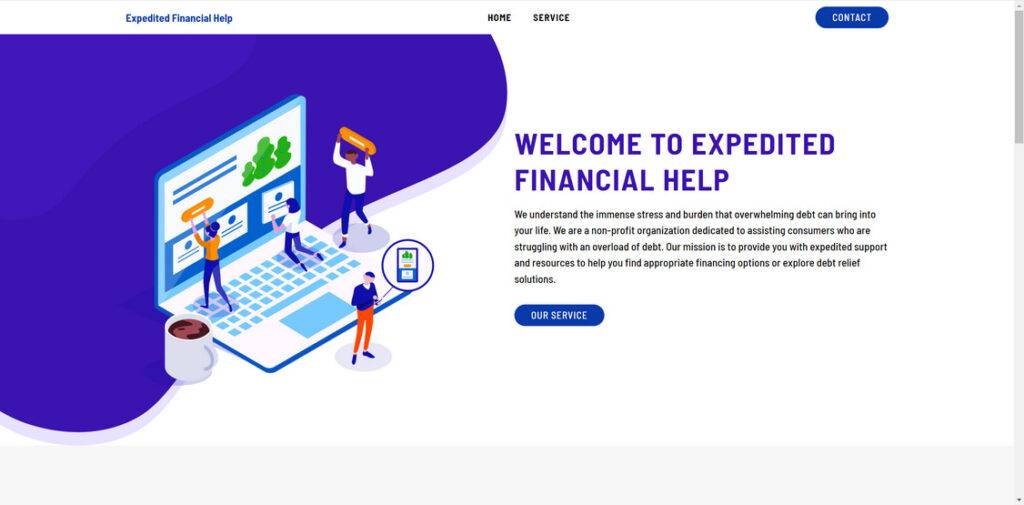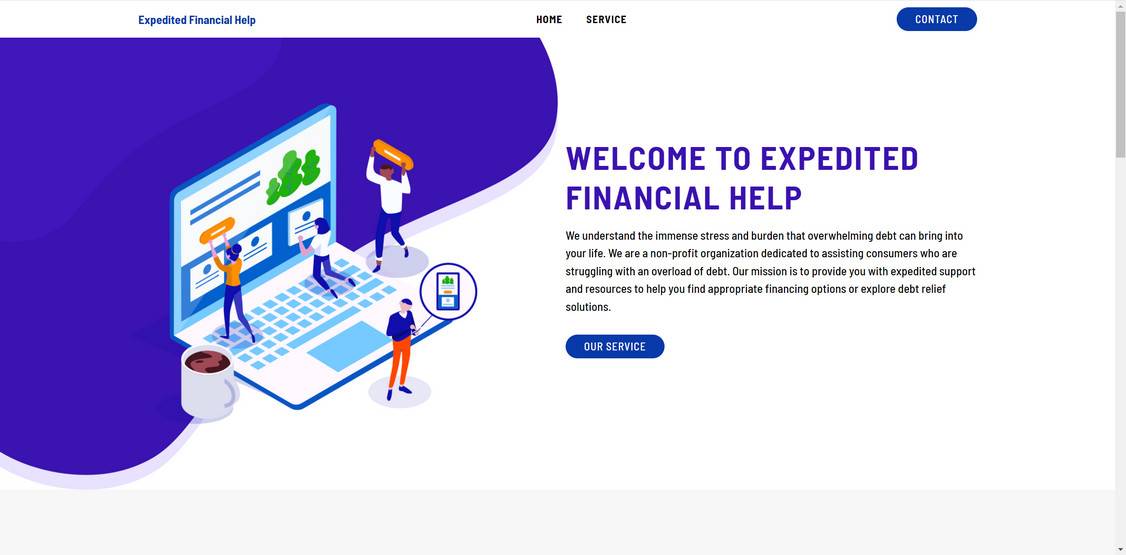Have you received a voicemail from Expedited Financial Help claiming you’ve been approved for a loan up to $75,000? Before you call them back, beware – this is a scam that is ensnaring unsuspecting victims across the country.

Overview of the Expedited Financial Help Scam
Expedited Financial Help poses as a legitimate loan company in order to deceive people into believing they can easily obtain loans with this company. However, Expedited Financial Help is not a real financial services provider. Their voicemails and phone calls are a front to lure victims into providing personal information and paying unnecessary fees in order to receive a loan that will never actually materialize.
This scam operates by cold calling potential victims and leaving voicemails stating that the recipient has been “pre-approved” for a loan up to $75,000 from Expedited Financial Help. The voicemails sound official and persuasive. They encourage recipients to call back a phone number to discuss the “loan opportunity” further and warn that the offer will expire if the victim does not act quickly.
However, if recipients call back the number, they will be prompted to provide sensitive personal and financial information. The scammers may also try to pressure victims into paying exorbitant “processing fees” in order to secure the fake loan. These fees can range from a few hundred to a few thousand dollars.
Victims lured in by the voicemails are convinced to share details like their Social Security Number, bank account information, credit card details, and more. The scammers use this info to steal victims’ identities and money. Despite paying fees and providing personal data, victims never receive the promised loan.
Below we’ll explore exactly how this predatory scam works, who is behind it, and what actions you can take if you’ve fallen prey to Expedited Financial Help’s voicemail loan offer.
How the Expedited Financial Help Scam Loan Offer Works
The Expedited Financial Help scam is quite sophisticated in terms of how it manipulates and deceives victims. Here is a step-by-step explanation of exactly how this scam operates:
Step 1: Victims Receive a Voicemail
The scam starts with victims receiving an unsolicited voicemail that appears to be from a representative of Expedited Financial Help. The voicemail explains that the recipient has been “pre-approved” for a substantial loan worth up to $75,000.
The amount offered seems randomly selected to be an enticing, large sum of money. The voicemail urges the recipient to call back before the loan “offer” expires.
Here is an example of the script scammers use in the voicemails:
“Hello this is Richard with Expedited Financial Help calling about your case file [random 6 digit number]. Please call back today before your eligibility expires at 888-555-1234.”
Hello, I am calling from Expedited Financial Help about potential options for your reference number [random numbers]. We have programs that can get you approved for up to $75,000. Call back at 888-555-6789.
The voicemails sound professional and legitimate. The scammers mention specific loan amounts and case file numbers to further trick recipients into believing this opportunity is credible.
Step 2: Recipients Call Back and Speak to “Representatives”
When recipients call back the number left in the voicemail, they reach a call center staffed with scammers posing as Expedited Financial Help representatives. The “representatives” reiterate that the victim has been pre-approved for a $50,000+ loan with minimal eligibility requirements.
The scammers will gain the victim’s trust by being friendly and citing the recipient’s “pre-approved” status. They’ll explain that all the victim needs to do to secure this loan is provide some personal info and pay a small processing fee.
Step 3: Scammers Deceive Victims into Providing Private Data
Next, the fake representatives will ask victims for sensitive personal and financial information needed to “process” the loan. This includes:
- Full name
- Date of birth
- Social Security Number
- Bank account and routing numbers
- Credit card numbers
- Income and employment details
- Government ID images
The scammers may say they need this data in order to check the victim’s credit and eligibility. However, they are simply harvesting personal information to commit identity theft.
Step 4: Victims Are Pressured to Pay Upfront “Fees”
In addition to gathering private data, the scammers will require victims to pay an upfront “processing fee” before releasing the loan funds. They may cite reasons like processing charges, credit checks, or insurance fees to justify this bogus fee.
The scammers will pressure and manipulate victims into paying right away over the phone. They want to collect fees before victims realize it is a scam. These fees can range from the hundreds to thousands of dollars.
Victims are instructed to pay the fee using wire transfers, prepaid debit cards, gift cards, or other non-refundable forms of payment. This prevents victims from ever getting their money back.
Step 5: Scammers Take the Money and Disappear
Once scammers have extracted private information and processing fee payments from victims, they take the money and disappear. They will cease all contact with victims.
At this point, victims realize there was never any $50,000+ loan waiting for them – it was all a scam to steal their personal data and money. But it is too late – the scammers have already drained victim’s bank accounts and harvested info for identity theft.
Expedited Financial Help will never actually provide victims with loan funds. The whole operation is a front to carry out fraud against unsuspecting consumers in need of loans.
Who is Behind the Expedited Financial Help Scam?
Expedited Financial Help seems like a legitimate lending company on the surface, but further digging reveals it is a fraudulent operation run by con artists. Here are the key details on who is behind this egregious scam:
- Expedited Financial Help is a Fake Company: Expedited Financial Help is not actually registered as a real business entity with state regulators. There is no physical company address or corporate info.
- Based Overseas: While scammers use spoofed domestic phone numbers, the Expedited Financial Help scam is believed to be operated overseas in countries like India or The Philippines. This makes them harder to trace and prosecute.
- Part of a Larger Identity Theft Ring: Expedited Financial Help appears connected to larger international criminal rings stealing identities and money on a massive scale. Their sophisticated processes indicate an organized scam operation.
- Scammers Likely Have Victims’ Data: The sensitive personal info collected is likely sold on the black market to other scammers. Stolen data equates to profit for these fraudsters. Victims’ identities are compromised.
- Call Centers with Turnover: Low-level scam workers in overseas call centers carry out the calls and interact with victims directly. When a scam operation is exposed, these frontline scammers are cycled out for new ones.
While the exact individual owners behind Expedited Financial Help cannot be pinpointed, it is clear an organized criminal entity is coordinating this scam. Avoiding contact and never providing personal details is the best way to protect yourself from their malicious tactics.
How to Spot the Expedited Financial Help Scam Loan Offer
Being able to recognize the signs of the Expedited Financial Help scam is key to avoiding becoming a victim. Here are tips on how to spot this predatory scam:
- You Receive an Unsolicited Voicemail: One of the first indicators of this scam is if you receive a voicemail out of the blue stating you’ve been preapproved for a loan. Legitimate lenders will not promise loans without you applying first.
- The Voicemail is Highly Personalized: The voicemail may include personal details like your name and a fake “case file number” to appear credible. This is a technique scammers use to build trust and intrigue.
- You are Promised a Large Loan Amount: A voicemail promising approval for a loan between $50,000-$75,000 should raise skepticism. Approving someone for tens of thousands of dollars without formal application is atypical.
- There is Urgency and a Deadline: Scammers will emphasize that you need to act now by calling back urgently before the loan offer expires. This is done to pressure victims into acting before thinking it through.
- You are Instructed to Call Back a Specific Number: The voicemail will include a number to return the call urgently. This allows the scam call center to field the call rather than a legitimate financial company.
- Personal Information is Requested: If you call back and are immediately asked to confirm private data like your Social Security Number, it is likely a scam attempt to harvest your information.
- Upfront Fees are Required: Rather than complete formal loan approval processes, scammers will invent fees you must pay upfront before getting the loan funds. Real lenders disburse loans directly rather than demand fees first.
- Aggressive and Manipulative Sales Tactics: Scammers may employ high pressure sales tactics if you question their practices. Threats to withdraw the loan offer are meant to make victims act quickly without scrutiny.
If you notice multiple red flags like these, you can feel confident the loan offer is not legitimate and the entity contacting you cannot be trusted. Proceed with extreme caution and avoid providing any personal or financial details if you suspect Expedited Financial Help is attempting to scam you.
What to Do If You’ve Fallen Victim to This Scam
If you received a voicemail from Expedited Financial Help and provided personal information or paid fees, here are important steps to take right away:
- Contact Your Bank: If you paid fees to the scammers, immediately call your bank and report the charges as fraudulent. Your bank may be able to reverse the transactions and block future charges if you act quickly.
- Call Credit Card Companies: If you provided credit card information, contact each company to report compromised cards so they can freeze accounts and issue new numbers. This prevents scammers from making charges.
- Place Fraud Alert: Contact one of the three major credit bureaus to place a fraud alert on your credit file. This signals you may be victim of identity theft and prompts scrutiny of new lines of credit opened.
- Review Accounts and Credit Reports: Carefully review all financial accounts and credit reports for any signs of fraudulent activity. Look for unfamiliar account inquiries, loans taken out in your name, or charges you don’t recognize.
- Reset Passwords and Security Questions: Change passwords, PIN numbers, and security question answers on all financial accounts to lock out scammers. Avoid using info like mother’s maiden name or first pet name.
- File Police Reports: File reports with local law enforcement and the FTC documenting you were targeted by this scam. This creates an official record in case more fraud occurs later.
- Learn from the FTC: Consult the FTC’s identity theft recovery guide for detailed steps to take when your personal information is compromised.
- Be Wary of “Recovery” Offers: Beware any call or email claiming they can recover lost funds for an upfront fee. This is almost always another scam tactic.
Frequently Asked Questions About the Expedited Financial Help Scam Loan Offer
Being targeted by scams can be confusing and concerning. Here are answers to some of the most frequently asked questions regarding the Expedited Financial Help scam loan calls.
What is the Expedited Financial Help scam loan offer?
The Expedited Financial Help scam starts with potential victims receiving a voicemail claiming they’ve been preapproved for a $50,000+ personal loan. The voicemail provides a callback number and urges recipients to call back quickly before the “offer” expires. However, Expedited Financial Help is not a real lender. When recipients call back, scammers manipulate them into providing personal details and paying fraudulent fees to secure loans that are never actually provided.
Who is calling me about this loan offer?
The calls come from offshore call centers staffed by scammers pretending to work for “Expedited Financial Help.” This company does not actually exist. The scammers cold call phone numbers in bulk to leave voicemails and then field callback requests.
Why am I receiving this loan offer voicemail?
Victims are typically chosen at random when scammers acquire lists of names and phone numbers to target. They leave voicemails blanketly to increase chances someone will call back and fall for the scam. Receiving a call does not mean you have done anything wrong or your identity was compromised previously.
Is this voicemail message actually from my bank?
No – the scammers simply claim to be from “Expedited Financial Help” but they have no legitimate association with any real financial institution or lender. Ignore any mention of a bank name in the voicemail, as it is a lie intended to build trust and trick callers.
Can Expedited Financial Help actually provide me with a $50,000 loan?
Unfortunately, no. Expedited Financial Help is a fake front used to scam potential victims. They have no intention or ability to actually provide loan funds. Any mention of preapproval for a specific loan amount is a manipulation tactic.
What happens if I call back the number left in the voicemail?
You will reach a scam call center where operators posing as “lending representatives” will ask for your sensitive personal and financial details. They may also require upfront payment of “fees” in order to secure the imaginary loan. In reality, they are just conning victims to steal identities and money.
What should I do if I receive this voicemail loan offer?
Do not call back the number, provide any personal or banking information, or pay any upfront fees. The safest course of action is to ignore the voicemail completely. You can also report the scam call to the FTC to help warn others.
I already called back and paid fees – what now?
If you already fell victim to providing information or paying fees, immediately contact your bank and credit card companies. Place fraud alerts on your credit files and review account statements for signs of identity theft. You can also file police reports about being scammed for documentation. But acting swiftly can help limit the resulting damage.
How can I avoid this loan scam in the future?
Remember legitimate lenders will not promise loans out of the blue or require upfront fees to release funds. Carefully researching any financial entity contacting you is wise. If something sounds too good to be true – like a random voicemail approving you for tens of thousands in cash – it is best avoided entirely.
The Bottom Line
The Expedited Financial Help scam loan offer tricks victims by promising them fast loan approval with great terms. But it is just a fraudulent front to steal money and identities. If their voicemail claims you can get a huge loan for just a small fee – hang up immediately. It is not worth risking your sensitive personal and financial data.
This scam is widespread and can financially devastate victims through stolen funds, ruined credit, and long-lasting identity theft. But you can protect yourself by being aware of their tactics, and acting swiftly to report them and safeguard accounts if you are targeted. With caution and wisdom, potential victims can avoid falling into the Expedited Financial Help trap.



